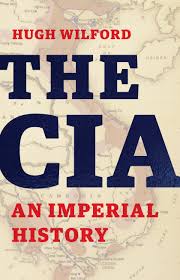Boosters of the CIA like to talk up its American ancestry, pointing out that spies helped win the Republic’s founding struggle against the British Empire as well as all its subsequent victories in major wars.
But this is not the whole story. The CIA was, after all, a foreign intelligence agency, so it makes sense that its genealogy would feature other, non-American branches, including a line descending from the New Imperialism, the European scramble for colonies in Asia and Africa that took place around the turn of the twentieth century. In part, this strand in the Agency’s DNA was a result of cross-fertilization—trans-imperial connections with other empires, the British especially.
If Bill Donovan was the CIA’s principal American trailblazer, who were the Agency’s main precursors from the age of the New Imperialism? Among several candidates for this honor, four stand out: two Britons, a Frenchman, and an American who participated in the most significant overseas US imperial venture of the era, the colonization of the Philippines. Between them, these individuals influenced or at least anticipated elements of all the CIA’s main types of operation: the gathering and analysis of intelligence, counterintelligence, and covert action, the last particularly in the realm of counterinsurgency. More negatively, they also foreshadowed many of the challenges and problems that would later confront CIA officers: intelligence failures, unintended operational outcomes, and the tendency of overseas interventions to boomerang home, whether in the form of publicity campaigns designed to whip up imperial sentiment or surveillance programs targeting anti-imperial dissenters.
Together, these four men’s lives tell the story of imperial intelligence in the years before the 1947 creation of the CIA—a necessary prologue to the history of the Agency, and a past that has haunted it down to the present day.
Among the CIA’s imperial precursors, one was especially important in shaping a crucial but often overlooked part of the Agency’s institutional identity: its imagination.
Rudyard Kipling was born to British parents in colonial Bombay (now Mumbai) in 1865. After a childhood spent largely in England, including a dismal stint in a grim South Coast boardinghouse, he gladly returned to India at age sixteen to launch his literary career. Young Ruddy loved the subcontinent, its “heat and . . . puffs of temple incense . . . and, above all, things wonderful and fascinating innumerable” (as he told his editor). Yet, despite this fascination, expressed most famously in his adventure stories The Jungle Books and his 1901 masterpiece Kim, Kipling was an ardent imperialist, utterly convinced that “Orientals” benefited from British rule. The imperial mission was, Kipling sincerely believed, a form of heroic self-sacrifice—the “White Man’s Burden,” as he entitled a hugely influential 1899 poem that secured his reputation as, to quote a recent biography, “the Laureate of the Empire.”
Look a little closer, however, and Kipling’s imperialism does not appear quite so confident. Recent histories of Britain’s colonial rule of India, the Raj, have dwelt less on its surface splendor than on its underlying insecurity. The British were spread very thin in India. In all, a mere 1,200 colonial officials administered a nation of some 280 million. Although British Victorians shared their American cousins’ dislike of spying—the word espionage was French, after all—the precariousness of this position placed a tremendous premium on intelligence. The Raj employed networks of local agents—secretaries, newsmen, and “running-spies”—to eavesdrop on Indian society. This strategy was effective, but only up to a point. The loyalty of the native informants was never entirely certain and, as Kipling himself admitted, the attitude of the majority of Indians toward colonial rule was “sullen” at best. The result was a constant, nagging sense of anxiety about possible intrigues by “inscrutable” yet “wily” Orientals, punctuated by occasional information panics about imagined plots and conspiracies. Yet the British failed almost entirely to detect signals of the impending Indian “Mutiny” of 1857, a massive colonial rebellion that nearly swept them from the subcontinent.
Compounding this sense of internal insecurity was an additional worry: the threat of invasion by a rival great power. Initially, the focus of such fears was France, but after the defeat of Napoleon it shifted to czarist Russia, transforming India’s mountainous North-West Frontier into the setting for an Anglo-Russian espionage contest, the “Great Game,” that prefigured the later Cold War between the United States and the Soviet Union. There was some basis to these invasion fears: Russia was jealous of Britain’s control of India, the “jewel in the crown” of Queen Victoria’s empire, and was sending probes beyond its southern flanks in a manner that also alarmed the Ottomans and Chinese. Nevertheless, there was a strong hint of paranoia in the behavior of both sides, with the British committing themselves to a series of ill-advised incursions into Afghanistan that again foreshadowed later Western misadventures in that tragic country. In 1842, for example, Britain suffered one of its worst-ever military disasters when Afghan tribesmen wiped out a garrison beating a chaotic retreat from an uprising in Kabul.
All these elements would come together in Kim, Kipling’s 1901 novel about an Anglo-Indian orphan, Kimball O’Hara, who spies on behalf of the British while crossing northern India on a spiritual quest. On the one hand, Kim is a picaresque romp, bathed in nostalgia for the author’s country of birth (Kipling had left India in 1889 to travel the world): its space, color, and scope for adventure. At the same time, the novel is a classic statement of imperial anxiety. Kipling was writing against the backdrop of the Boer War of 1899–1902, a botched British counterinsurgency campaign against rebel Afrikaans farmers in South Africa that fueled a growing sense among metropolitan Britons of imperial fragility. While Kipling’s vivid depiction of his Indian characters tends toward condescension, his treatment of certain British colonial types, sahibs with “dull fat eyes,” is downright hostile. The implication is that ignorant, complacent Britons posed as great a danger to the empire as did unruly colonial subjects or imperial rivals. In Kim, the only thing standing between the Raj and the Russians is an orphan boy and a handful of loyal native accomplices.
Among its many claims to distinction—critics have lauded it variously as a masterpiece of Indian, imperial, and children’s literature— Kim is remarkable as the first great spy novel. Intelligence historians have debated the verisimilitude of its portrayal of the Great Game, some claiming Kipling entirely made up his story, others pointing out that Indian agents or pandits disguised as Buddhist pilgrims really did roam the North-West Frontier. But Kim did not merely reflect the real spy world; it also helped shape it. In the years after its publication, Kipling became increasingly outspoken in his criticism of imperial security, complaining not only about India’s vulnerability to Russia but also about the growing threat posed by imperial Germany to Britain itself. Other, lesser writers joined in the chorus, coming up with invasion-scare stories that featured plucky gentlemen spies foiling dastardly German plots to conquer England. With British public opinion gripped by a veritable spy mania, in 1909 the Committee of Imperial Defence created the Secret Service Bureau, Britain’s first independent, professional intelligence agency, and the direct organizational forerunner of both the foreign Secret Intelligence Service, MI6, and the domestic Security Service, MI5. Two years later, in 1911, the government rushed through the extraordinarily sweeping Official Secrets Act, effectively hiding the new intelligence apparatus from the British public. Kipling, by helping invent a new literary genre, the spy thriller, had also contributed to the creation of the actual British secret service.
___________________________________
Excerpted from The CIA: An Imperial History by Hugh Wilford. Copyright © 2024. Available from Basic Books, an imprint of Hachette Book Group, Inc.


















